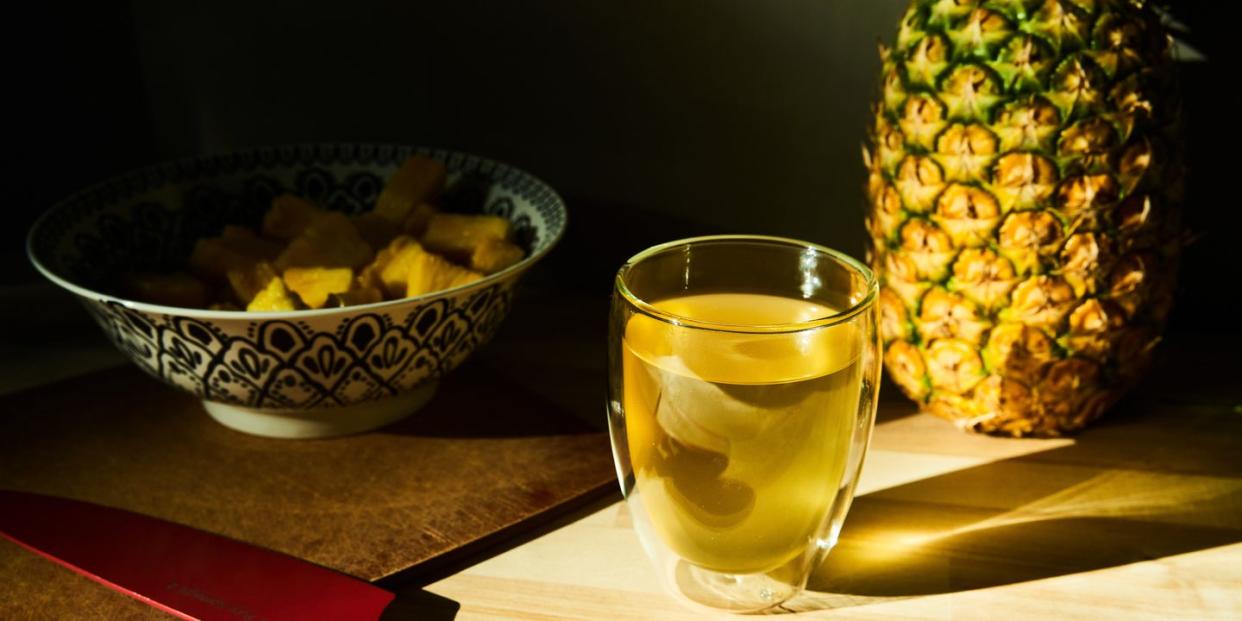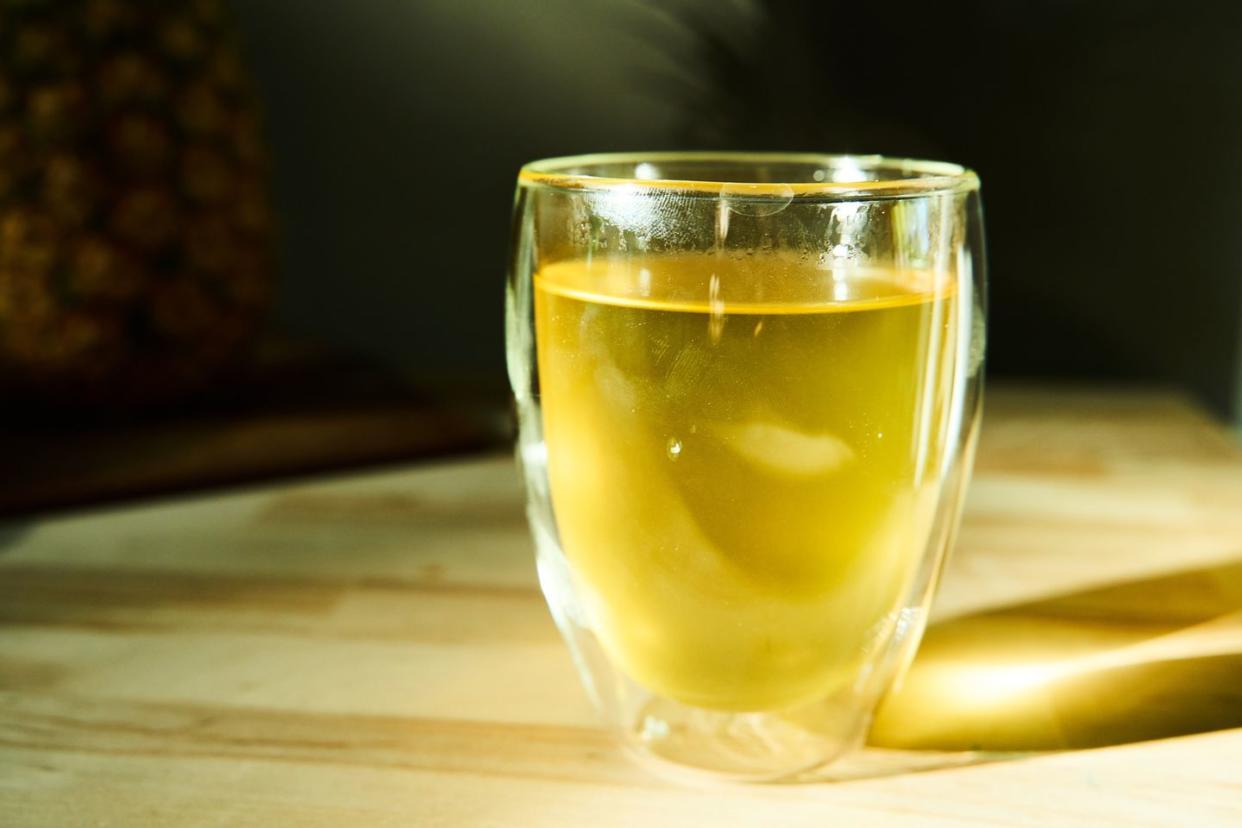Why Is Everyone Making Pineapple Tea?

"Hearst Magazines and Yahoo may earn commission or revenue on some items through these links."
Whether you brew a cup of tea at home or swing by a coffee shop to get your daily dose, science suggests you’ll score some body and brain benefits from drinking it. Depending on the variety you select, such as matcha or another green tea, black or white tea, your brewed beverage may potentially lower risk for heart disease and certain cancers, while boosting creativity and mood.
But what happens when your “tea” isn’t made with leaves? The latest tea trend involves pineapple skin, a portion of the fruit most of us are familiar with tossing into the compost pile. Those who steep and sip on this trendy drink often claim that it has magical powers to combat allergies (‘tis the season!) and inflammation, while delivering a natural “detox.”
Read on to learn more about how to make pineapple tea, why it’s trending, and discover if the tropical tea can deliver on any of those bold health claims.
What is pineapple tea?
The recipe is pretty simple: “Just like you steep tea leaves to make a cup of true tea, you steep pineapple pieces to make a pineapple tea,” explains Lauren Manaker MS, RD, LD, a registered dietitian and owner of Nutrition Now Counseling in Charleston, South Carolina.
Some recipes call for the skin (a.k.a. shell or rind) and the flesh, while others just call for the skin.
“To make pineapple tea at home, place pieces of pineapple including the skin, flesh, and inner core in a pot with water, and bring it to a boil. Once boiling, turn it down to a simmer, and let this simmer for 30 to 60 minutes,” says Roxana Ehsani, MS, RD, CSSD, a Miami-based board-certified sports dietitian.
If desired, you can add a bit of honey or sugar for sweetness or simmer the pineapple pieces alongside cinnamon, rosemary, ginger, or turmeric for more flavor.
Is pineapple tea healthy?

Just like all fruits, pineapple is full of antioxidants and energy-boosting natural sugars.
“Pineapple is rich in vitamin C, a powerful antioxidant that helps support a strong immune system. But once you boil pineapple in water, a lot of that vitamin C will get lost. Vitamin C is a heat-sensitive vitamin, which means that heat can destroy it,” Ehsani says.
What’s also important to note: If you’ve spotted any claims that pineapple tea is an “antioxidant drink” or “detox drink,” don’t be deceived. In addition to that immune-supporting vitamin C getting lost in the boil, your organs do all of the detoxing your body requires. Also, any of the digestion-supporting fiber in the fruit is no longer present if you simply steep it.
“To get the most nutrition from your pineapple, [you need to] eat it raw,” Ehsani says.
In addition to the immunity and detox claims, some who swear by pineapple tea believe it can help relieve allergies and inflammation due to the presence of an enzyme called bromelain, found in the pineapple’s skin. One study, performed on mice, found that bromelain extract may help tame inflammation related to asthma, but it’s too early to say if the same holds true among humans.
“Research suggests that bromelain may play a role in fighting inflammation and reducing the risk of chronic disease,” says Natalie Rizzo, MS, RD, plant-based sports dietitian with Greenletes in New York City and the author of Planted Performance. “That said, bromelain levels in pineapple tea have not been studied, so it’s difficult to say how much of this enzyme is actually in the tea—and if it has beneficial properties.”
As of spring 2023, no peer-reviewed clinical trials have been published about any health benefits of drinking pineapple tea, so science has yet to back up any declarations about its magical powers across wide populations. Plus, since there are so many different recipes for making pineapple tea, the actual pineapple (and bromelain or vitamin C) content in the tea can vary widely from cup to cup, Manaker says. In other words, we don’t have any proof about how much pineapple tea you’d need to drink to score any potential wellness wins.
“I doubt you are getting many of these benefits from the small amount of tea you’re drinking,” Rizzo adds.
That said, if you struggle to drink plain water and find pineapple tea to be a tasty alternative because it’s infused with mild tropical fruit flavor, it can be a helpful hydration-booster. And as a cyclist, you need to make sure you’re taking in enough fluids.
Are there any downsides to pineapple tea?
Unless you have a pineapple allergy, “there aren’t really any drawbacks to drinking pineapple tea, except if you add a ton of sugar or honey to your tea to make it palatable. Then it goes from being a healthy, hydrating drink to a sugary beverage that should be limited,” says Rizzo.
If you do decide to try pineapple tea, be sure to clean the rind before boiling and simmering it in the blend.
“Pineapple rind is exposed to many opportunities that can cause it to harbor bacteria. If your pineapple isn’t washed well before making the tea, your drink can harbor these bacteria too,” Manaker says.
Tap water, a vegetable brush, and a good scrub from top to bottom should do the trick.
The bottom line on pineapple tea
Feel free to make this drink trend part of your day, if you enjoy drinking it. Pineapple tea recipes perk up plain old water and infuse it with a hint of tropical essence, as well as your selection of spices. Just don’t think of it as a magic pill, Ehsani says. Pineapple tea is no replacement for medical treatment for allergies, asthma, or inflammation, and for all those ailments, you should check with your doctor for the best solutions to support your personal health.
“Anyone who wants to drink pineapple tea should, but they should also know it’s not a miracle cure-all. You’re better off eating pieces of pineapple flesh, which is chock-full of vitamin C,” Rizzo says.
You Might Also Like
